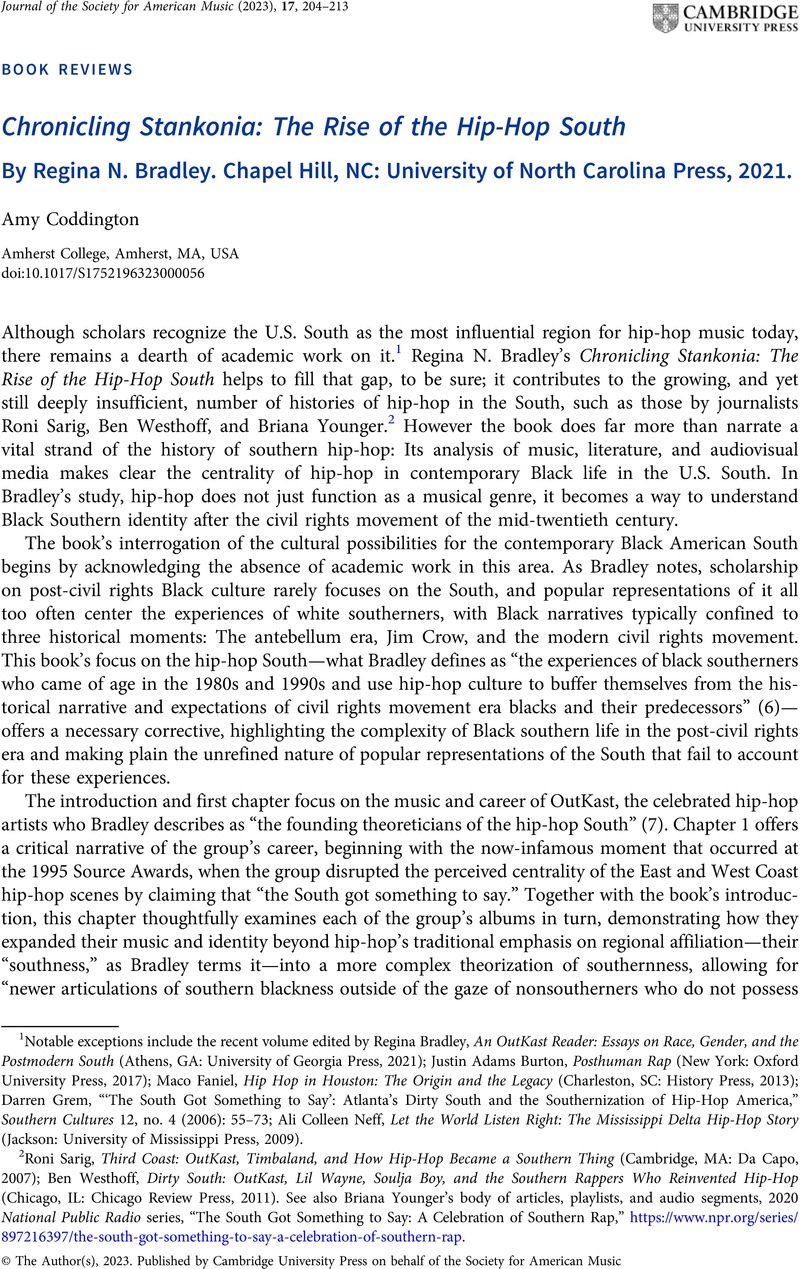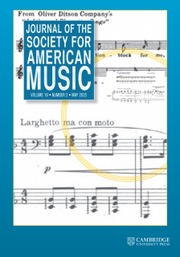No CrossRef data available.
Article contents
Chronicling Stankonia: The Rise of the Hip-Hop South By Regina N. Bradley. Chapel Hill, NC: University of North Carolina Press, 2021.
Review products
Published online by Cambridge University Press: 28 March 2023
Abstract

- Type
- Book Review
- Information
- Copyright
- Copyright © The Author(s), 2023. Published by Cambridge University Press on behalf of the Society for American Music
References
1 Notable exceptions include the recent volume edited by Bradley, Regina, An OutKast Reader: Essays on Race, Gender, and the Postmodern South (Athens, GA: University of Georgia Press, 2021)Google Scholar; Burton, Justin Adams, Posthuman Rap (New York: Oxford University Press, 2017)CrossRefGoogle Scholar; Faniel, Maco, Hip Hop in Houston: The Origin and the Legacy (Charleston, SC: History Press, 2013)Google Scholar; Grem, Darren, “‘The South Got Something to Say’: Atlanta's Dirty South and the Southernization of Hip-Hop America,” Southern Cultures 12, no. 4 (2006): 55–73CrossRefGoogle Scholar; Neff, Ali Colleen, Let the World Listen Right: The Mississippi Delta Hip-Hop Story (Jackson: University of Mississippi Press, 2009)CrossRefGoogle Scholar.
2 Sarig, Roni, Third Coast: OutKast, Timbaland, and How Hip-Hop Became a Southern Thing (Cambridge, MA: Da Capo, 2007)Google Scholar; Westhoff, Ben, Dirty South: OutKast, Lil Wayne, Soulja Boy, and the Southern Rappers Who Reinvented Hip-Hop (Chicago, IL: Chicago Review Press, 2011)Google Scholar. See also Briana Younger's body of articles, playlists, and audio segments, 2020 National Public Radio series, “The South Got Something to Say: A Celebration of Southern Rap,” https://www.npr.org/series/897216397/the-south-got-something-to-say-a-celebration-of-southern-rap.
3 Laymon, Kiese, Long Division (Chicago, IL: Agate, 2013)Google Scholar; OutKast, Aquemini, LaFace Records, 1998, MP3.
4 Django Unchained, directed by Quentin Tarantino (Culver City, CA: Columbia Pictures, 2012); Jones, Edward P., The Known World (New York: HarperCollins, 2003)Google Scholar; Underground, created by Misha Green and Joe Pokaski (NBC: 2016–17).
5 Ward, Jesmyn, Men We Reaped (New York: Bloomsbury, 2013)Google Scholar; Ward, Jesmyn, Where the Line Bleeds (Chicago, IL: Agate, 2008)Google Scholar.
6 Boylorn, Robin, Sweetwater: Black Women Narratives and Narratives of Resistance (New York: Peter Lang, 2013)Google Scholar; Cooper, Anna Julia, A Voice from the South, Dover Thrift Editions (Mineola, NY: Dover, 2016)Google Scholar; Hurston, Zora Neale, Their Eyes Were Watching God, 1937, Reprint edition (New York: Amistad, 2006)Google Scholar; Laymon, Long Division; OutKast, “Da Art of Storytellin’ (Part 1),” MP3 audio, Aquemini, LaFace Records, 1998.




